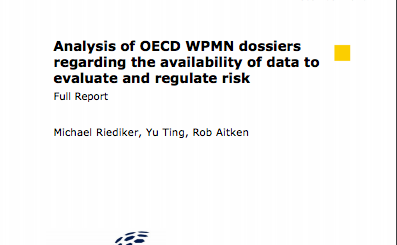Analysis of OECD WPMN Dossiers Regarding the Availability of Data to Evaluate and Regulate Risk (Dec 2016)
ANALYSIS OF OECD SUBSTANCE TESTING PROGRAMME NANOMATERIALS DOSSIERS The Sponsorship Testing Programme of the Working Party on Manufactured Nanomaterials (WPMN) of the Organisation for Economic Co-operation and Development (OECD) started in 2007 with the aim to test a selection of 13 representative nanomaterials for many endpoints. The main objectives of the programme were to … Read More.
